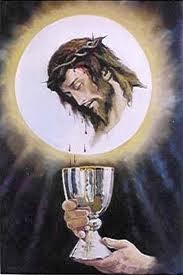EXTRAORDINARY SIGNS
The signs of the
Mass are simple, but their spiritual effects are extraordinary... It is Jesus
Himself who lives and acts through the sacred signs of the Mass.
One of the most
impressive of all Catholic shrines is that which commemorates the apparitions
of Mary, the Immaculate Conception, in Lourdes, France. In Lourdes, miraculous
cures have occurred, many of them authenticated through the most intense
scrutiny by a team of experts. To see, and even more to experience personally,
such a miracle would indeed be a tremendous bolstering of one's faith.
The people in
today's Gospel of Luke were looking for some such miracle from Jesus, some
spectacular proof of His claims. But Jesus refused to give any extraordinary
sign to them. His preaching of the word of God should have been sign enough. He
pointed out that the people of Nineveh, pagans though they were, accepted
Jonah, and He, Jesus, was much greater than Jonah.
Though we are
people of faith, it is only natural that once in a while we wish for some
extraordinary sign from God to confirm our faith. For the most part, however,
we must live simply, accepting the ordinary signs of God's activity among us,
the most important of which are found in the Mass. First, the Mass is the sign
of our coming together as God's people. Second, we ourselves are a sign of the
presence of Jesus, for as Jesus promised, "Where two or three are gathered
in my name, there am I in their midst." Actually it is Jesus who continues
to pray within us as members of His Body. Third, the Word of God is also a sign.
The Constitution on the Sacred Liturgy reminds us that Jesus "is present
in His Word, since it is He Himself who speaks when the holy Scriptures are
read in the Church" (7). It is Jesus who renews the offering of Himself in
the sacred sign of the consecration, and Jesus who comes to us under the sign
of food and drink.
Summing up these
ideas, the Constitution on the Sacred Liturgy declares, "In the liturgy
the sanctification of man is signified by signs perceptible to the senses and
is effected in a way which corresponds with each of these signs; in the liturgy
the whole public worship is performed by the Mystical Body of Jesus Christ,
that is, by the head and members" (7).
There can be some
question about what kind of sign Jonah is. But it seems reasonable to take it
to mean that just as Jonah was three days and three nights in the belly of the
whale before being delivered, so Jesus will suffer and die before being raised
from the dead. The only sign, therefore, that Jesus is going to give is that of
His passage from death to life in what we call the Paschal Mystery. This is
what the journey from Lent to Easter is all about; this is what the Mass is all
about; this is what being a Christian is all about. This is it! This is the one
great sign! And it doesn't refer only to Jesus going through suffering and
death for us, and then rising, but to the fact that this is the pattern for any
and every human life.
The signs of the
Mass are simple, but their spiritual effects are extraordinary, for they are a
sign of the presence and activity of one who is much greater than Jonah or
anyone else. It is Jesus Himself who lives and acts through the sacred signs of
the Mass.
No wonder we have
the right to celebrate and give thanks!

